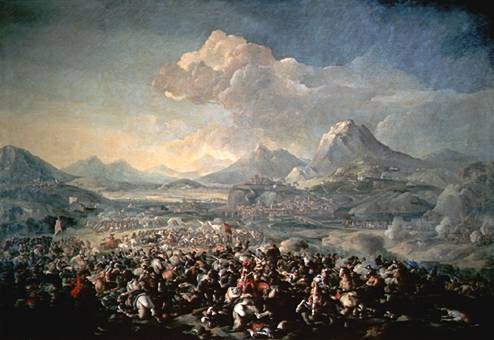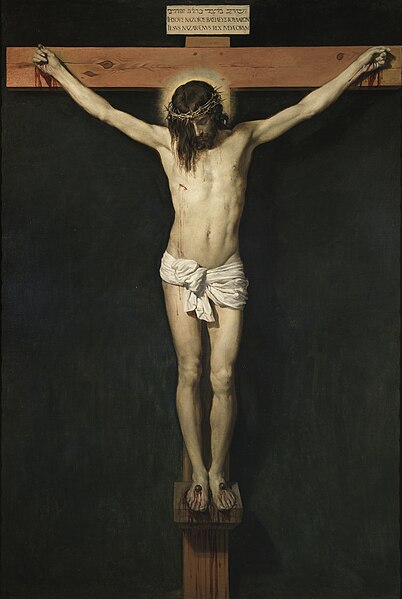Today in Social Sciences... I've arrived late, and Paqui has told me that today was my turn to do the journal. We have started to correct the summary about The Decline of the Hispanic Empire:
-PHILIP II (1598-1621): he banded his power over the Duke of Lerma, who convinced the king to move the capital city to Valladolid because he had a lot of land there. Then he did the same with Madrid. This was a very intelligent operation.
This corruptions was the end, but he tought that if he was a member of the Church he couldn't be judged by the Courts. This is a case similar to Bárcenas, Julián Muñoz...
In the war of the Low Countries there was a truce. Another decision related to religious was the expulsion of the Moorish, but this decision was a very bad decision, specially for the economy of the Crown of Aragón because more than 275,000 people were expelled.
There were a devaluation of currency: gold and silver coins were mixed with copper.
If you want to know more information about the corruption at Philip III's court here there is a link to a post Paqui wrote about the Duke of Lerma last year.
-PHILIP IV: he banded his power over the Count-Duke of olivares, who was obsessed with consolidatin the Hipsanic hegemony in Europe and stablishing the same laws over all the peninsular kingdoms. He took this decisions in order to achieve these objectives:
-Participation in the Thirty Years' War (1618-1648): this war confronted the Protestant kingdoms of the north of Europe with the Catholic kingdoms of the south of Europe. France joined the Protestants to defy the Habsburg dynasty hegemony and the Spanish army was defeated in Rocroi (1643). The war ended in 1648 with the signature of the Treaty of Westphalia and the United Provinces of Holland became independent.
-Project of the union of Arms: the kings considered Castile as the center of the empire and the Count-Duke wanted to extend the laws of Castile throw the rest of the Empire. There was a revolt because the rest of the kingdoms wanted to preserve their laws. The hispanic monarchy was supporting the Austrian emperor in order to keep the hegemony in Europe. Project of the Union of Arms provoked oprisings in different kingdoms:
- Catalonia, supported by France, the conflict ended with the Peace of Pyrenees (1659). Aragon lost the territories of Rosellón and Cerdaña.
-Portugal: the conflict ended with the Treaty of Lisbon and the definitive independence of Portugal (1668).
-Portugal: the conflict ended with the Treaty of Lisbon and the definitive independence of Portugal (1668).

Paqui has told us an anecdote about Philip IV: he liked women a lot, when he was in love with the woman he like he did all he could. He fall in love with a nun, and he went into the convent at night and he raped the nun. There was a serious conflict. As a way of asking of forgiveness, he asked to Velazquez to paint this painting:

He gave these painting to the convent as a penance, and the convent forgive him.
Paqui has told us that there is a film about Philip IV called "El rey pasmado". If you want to know more about this film there is a post that Paqui has writen today.
-CHARLES II: this king was unable to rule, he was phisically and mentally disabled. The experts thought that Charles II had Klinefelter Syndrome. He was impotent. Aparently he was a man but his aspect was feminine. He didn't speak until he was 4 and he didn't know how to walk until he was 8. The people around him thought that he was hexed. But the difference with this king, is that he tried to rule, not like his father. Juan José of Austria and Fernando de Valenzuela were his validos, and also his mother sometimes helped him to rule.

If you want to know more about the Klinefelter Syndrome here there is a link:
This is what we have done today in Social Sciences. Paqui wanted to start to correct the summary about Demography, Economy and Society, but the bell has rung and we didn't have time.
This are the new words Paqui has writen for our glossary:
-Currency: moneda de curso legal
-Imperial Policy: política imperial
-Truce: tregua
-Harmful: perjudicial
-Up to that moment: hasta ese momento
-Inflation: inflación
-To keep: mantener
-Nun: monja
-To rape: violar
-Penance: penitencia
-Inbreeding: endogamia
-Hexed: hechizado, endemoniado
-Exorcism: exorcismo
-To spray: rociar
-Bloodlething: sangría (to expel an illness from the blood)
See you tomorrow my beautiful classmates (and teacher)!
6 comments:
Good work, María. I'll have a deeper look to what you've written tomorrow. Good night!
Very good and very complete journal, María.
I think that the word "banded" is wrong. You should write "handed" instead of "banded".
See you!
Hello María:
I have to say that I love your comparison between the Duke of Lerma and Bárcenas..it’s just great..but, as you know, I have to focus on grammar and vocabulary mistakes too…. Most of the mistakes are just a matter of paying attention, specially the this/these issue….
Change what Daniel told you “BANDED” for “HANDED”
Please, be careful with singular and plural:
1) THIS corruption
2) There WAS a devaluation
3) THIS DECISION/THESE DECISIONS
Another decision related to RELIGION
This decision was a very bad ONE (Don’t repeat decision twice. You can use the pronoun “one”)
ConsolidatinG
HISPANIC
Duke wanted to extend the laws of Castile thROUGH the rest of the Empire.
Project of the Union of Arms provoked UPrisings in different kingdoms:
he was in love with the woman he likeD he did all he could. He fELL in love with a nun,
As a way of asking FOR forgiveness,
He gave THIS!!!!!! painting to the convent as a penance, and the convent forgave him.
ApParently he was a man
ThESE!!!!!!! are the new words Paqui has writTen
Hello María,
Dani's correction is OK
These are my comments to improve your journal:
- At the beginning of your journal you could add the common feature to these three reigns (the government in the hands of the validos)
- The Duke of Lerma corruption scandals meant the end of his power... he couln't be judged by the king's/ royal court
- You can connect some ideas in a better way: the serious economic situation led to a more realistic policy in the Empire (Twelve Years' Truce) and the devaluation of currency
- Olivares wanted to extend the laws of Castile to the rest of the Empire and this created a generalized revolt in different parts of the Empire
- This sentence " The Hispanic Monarchy was supporting the Austrian emperor in order to keep the hegemony in Europe" doesn't belong to the project of Union of Arms, but to the Thirty Years' War. The HIspanic Monarchy supported the Austrian Emperor during this war
- uprisings... There were many uprisings, but the most serious ones were in Catalonia and Portugal
-You should add a caption for the picture you've chosen
- About Charles II,... experts think... Remember that I said that he was submitted to periodic exorcisms, because the people around him thought that he had the devil inside.
- Bloodletting
That's all about content. Cristina will correct the remaining mistakes. There are some spelling mistakes you will easily find if you read your journal carefully.
See you!
Cristina and I have been correcting the mistakes at the same time. That's why some are repeated!
Hi María! Your journal are very complete and perfect. You have done a very complete work! You have had some mistakes that Paqui and Cristina have corrected. Congratulations, kisses :)
Post a Comment